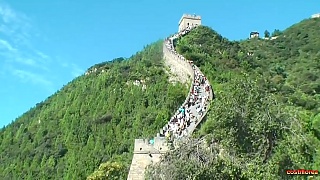
|
A mild-flavored winter radish usually characterized by fast-growing leaves and a long, white, napiform root. It is similar in appearance to fresh horseradish but packs a lighter peppery punch similar to watercress. Unlike other radishes, it is as good cooked as it is raw.
A very beautiful film and culinary masterclass with LiZiQi 李子柒.
Dishes include SiChuan pickles, NorthEast sauerkraut and several types of XianCai, salty side-dish, and SuanCai, sour cabbage, with spice and without. Similar to Korean kimchi - Korean is one of the 56 ethnic groups in China.
Don't miss it ...
Rimo Z :
0:23 Rapeseed flowers
2:50 White Radish
3:37 Carrot
4:31 Chinese Cabbage
6:03 Mustard, then dehydrate the vegetables
7:58 Smear chilli sauce
8:28 Sealed for 1 month
8:51 Pine leaves for smoking the meat (Bacon)
9:03 Orange or clementine
9:10 Pomelo on the tree
9:22 Start smoking the sausage and meat
9:30 Add the pomelo and orange peel to enrich the flavor
10:16 Add salt and chilli powder, start pickling the dehydrated radish and carrots
10:36 Dried fish
11:58 put the dried fish, sausage and meat (or bacon) for boiling before eating or further cooking, this step helps to clean the food and reduce the salt
12:47 stir fry with ginger and then start stewing with green onion and orange peel
13:34 Fermented pickle cabbage (non-spicy)
13:49 Fermented pickle cabbage (spicy)
14:06 Minced meat with oil, spice powder, green onions, soy sauce, ginger and 14:14 hot oil to increase the aroma
14:26 Chop the pickle Chinese cabbage
14:38 Mix the minced meat and pickled cabbage, start making dumplings
15:53 Cut the salted meat, stir fry with green onion and stew with the dried vegetables
15:52 Add spicy pickled cabbages
16:16 Add some hot oil on top of the pickle dishes to excite the fragrance
16:42 Cut the boiled sausage, salted meat etc.
17:49 Looks like rose tea
17:55 Just white congee
米老鼠 : Kimchi first appeared in the book of songs. It was interpreted as sauerkraut in China. Korean kimchi originated in the Tang Dynasty. Tang Dynasty general Xue Rengui was assigned to Korea (today's Korea) by the government to settle down in Korea. Many of his entourage were from Jiangbei County, Chongqing, who could make kimchi in his hometown. Since then, Chongqing kimchi has entered Korea. Several wars in Korea have brought this kind of dish into Korean civilian families. Kimchi went through several stages before it became the real Korean kimchi. The first stage is the Three Kingdoms period, when the pickled dishes or radish, cucumber, etc., introduced to South Korea after adding leeks and other fresh vegetables. In the second stage, in the Korean period, the production methods began to be enriched, and the raw materials were added to the base. The third stage is that cabbage has become the main raw material, which is what we eat now.
|
 How the US tried to undermine Hong Kong (and thereby China)
How the US tried to undermine Hong Kong (and thereby China)



